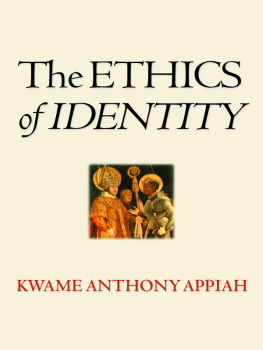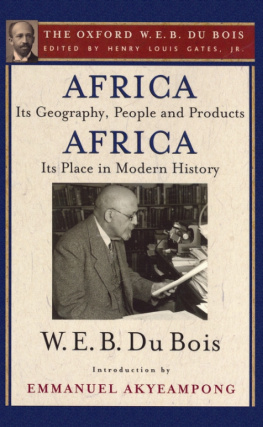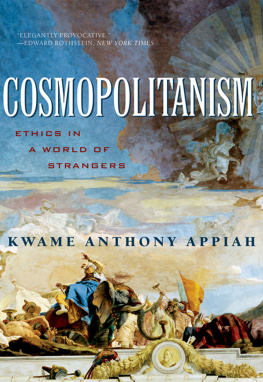Copyright 2014 by the President and Fellows of Harvard College
All rights reserved
Jacket credits: Art National Portrait Gallery/Art Resource
Jacket design: Tim Jones
The Library of Congress has cataloged the printed edition as follows:
Appiah, Anthony
Lines of descent : W. E. B. Du Bois and the emergence of identity / Kwame Anthony Appiah.
pages cm
Includes bibliographical references and index.
ISBN 978-0-674-72491-4 (alk. paper)
1. Du Bois, W. E. B. (William Edward Burghardt), 18681963. 2. EducationPhilosophy. 3. African AmericansEducation. 4. African American intellectuals. 5. IntellectualsUnited States. 6. Identity (Philosophical concept) I. Title.
LB875.D83A67 2014
973.04960730092dc23
[B] 2013030761
Book design by Dean Bornstein
O N November 3, 1958, W. E. B. Du Bois returned to his alma mater in Berlin to accept a diploma. He was ninety at the time; both he and the institution had endured considerable tumult in the previous half-century. But the building at Unter den Linden 6 seemed little altered. With its Palladian windows and Corinthian pillars, the late-baroque facade revealed its mid-eighteenth-century origins as a palace for a Prussian prince. At the turn of the nineteenth century, Friedrich Wilhelm III had placed the elegant building in the hands of his energetic minister of education, Wilhelm von Humboldt, and in 1809 the Berliner Universitt, which came to be named for its royal patron, enrolled its first students. After the Second World War, the German Democratic Republic renamed it the Humboldt University, for Wilhelm and his equally accomplished brother, Alexander; Du Bois would have passed by marble statues of the brothers as he entered.
Inside rose a central stairway clad in red marble, redone in GDR 1950s-style grandeur; a gilt-leafed quote from notable alumnus Karl Marx shimmered above it: Philosophers have previously only interpreted the world in various ways; the point is to change it. Much of the building had been damaged during the war, but its reconstruction had been a priority for the East German regime, and it had reopened five years earlier, ornamenting what Du Bois described as a city with new buildings and enterprises, along with ghosts of war and destruction.
On that November day, as a chamber group played Bach, Du Bois stood at the dais of the Senate Hall, a long auditorium with coffered ceilings and grand, arched windows. He may have noticed the large oil paintings of the two Humboldts; he certainly noticed the presence of women, a welcome change since his student days in the early 1890s. The dean of the faculty of political economy, Professor Heinz Mohrmann, commended Du Bois as a unique role model, and continued:
Learning, doing research, teaching, and fighting for the application of scientific knowledge: this is what characterizes the many decades of your work. Full of admiration and profound respect, esteemed Professor Du Bois, we recognize the unique synthesis of scientific knowledge and politically-directed action which distinguishes your entire life. The council of my faculty has therefore unanimously decided, in view of your great scholarly achievements, as well as of your unique contribution to the struggle for the emancipation of Negroes within and outside of the United States, and for your courageous commitment to the preservation of peace, to bestow upon you the degree of Doctor of Economics, honoris causa.
After receiving a standing ovation, Du Bois, deeply moved, told the audience, Today you have fulfilled one of the highest ambitions of my young manhood.
When he entered the university, more than six decades earlier, it was a roiling profusion of schools and ideologies. It was a realm in which cosmopolitan and anticosmopolitan forces contended and sometimes converged, in which concepts of culture, race, nation, individuality, development, and the laws of history were studied and disputed. Youth, Du Bois wrote, seeks More light! (quoting, as it happens, Goethes deathbed cry), and the light to be found at the university, flickering and inconstant, was generated by friction and fire. Du Bois had quit his country for the first time and found himself almost four thousand miles from the world he knew, left to fend for himself in the very heart of the Kaiserreich, at the height of its colonial ambitions. It was the time of his life.
I want to explore, in this study, Du Boiss preoccupations, keeping this intellectual milieu especially in mind. But it will be salutary to begin with a note of caution. Although it is common enough to discuss intellectual genealogies, that metaphor is perhaps too determinatein the mode of those biblical catalogs of begatsto capture the ferment of the mind. Every intellectual era has its wild yeast, its drifting spores unremarked, unbidden, and (for better or worse) unavoidable. Im more drawn to a model suggested by the sociologist Robert K. Mertons work on what he called multiples in the history of scienceindependent, simultaneous discoveries of the same thing turn out to be the rule, rather than the exceptionand by his notion of the matrix of discovery. Francis Bacon, he thought, had it pretty much right: advances proceed from an accumulating base of knowledge, argument, and insight. Researchers tend to flourish in concerted effort rather than closeted inquiry. There is a reason that science took off in company with the growth of the postal service and has accelerated with telegraph, telephone, and email: the advancement of learning is the work of communities, groups of people in communication. The fact that Du Bois was the most exceptional of persons does not mean he wasnt also a Representative Man. In this spirit, it seems wiser to speak of matrices, albeit rendered in watercolor rather than in inked intaglios of transmission.
If we think in terms of a matrix from which Du Bois drew and to which he contributed, well also be protected from a related distortion. We often imagine teaching as decanting: a scholar pouring wisdom into a pupil. I dont wish to underplay such vertical legacies. Instructors do instruct, at least on good days. But the Mertonian matrix also invites us to think about the horizontal, peer-to-peer aspects of education, which are often at least as important. If we want to know what ideas were in the air, we can learn, too, from Du Boiss fellow students, whether or not they were rubbing elbows or sharing an inkwell.
The intellectual ferment of Du Boiss Lehrjahre what he called his Age of Miraclescannot be reduced to a small set of doctrines or disputes. There were manifold strains and tensions and tendencies, and not a few were implicated in Du Boiss own project of reclaiming and redefining the race concept. He sought a model of racial politics that was not Booker T. Washingtons model of subordinate development, not the difference-denying universalism of certain humanitarians (There is no Negro problem, Lyman Abbott, the Boston Congregationalist theologian, insisted loftily in 1890, only the problem of humanity), not Bishop Henry Turners fantasy of separatism and emigration, not even Frederick Douglasss ultimate assimilation through self-assertion. Du Bois was determined to chart another way; and like another great American writer, he encompassed contradiction, contained multitudes. The contradictions in Du Boiss work are never explicitly endorsed, of course, and not always under authorial control. But he does seek often to reconcile tendencies that others thought opposed. So his path would be scientific and romantic; it would be fact-bound and fanciful, liberal and illiberal, collectivist and individualist. It would be ethnocentric and universal in outlook. It would be the story of his singular selfand, in his providential formula, a message for the world.













 Harvard University Press
Harvard University Press